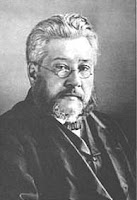It's an odd thing that so many simple church bloggers have murky, soupy, grayish, ill-defined theology. It's odd because most Christians who blog about simple church life do so out of biblical conviction. They read what the bible says about church life and then say, "This is the way it should be now." They, myself included, then look to the institution and say, "No thanks!"
Now to the odd part. A significant number of bloggers who espouse simple church principles at the same time call into question numerous points of theology that the church as a whole is in general agreement upon (or at least used to be). It's weird. Many of the same simple church people who point to the bible for church life then ignore the plain teachings of the bible when it comes to theology, salvation, cultural issues, etc. It is a strange situation indeed.
My biggest concern is the simple church bloggers who call into question Jesus Christ's atoning work on the cross. It appears to embarrass them just as it does the liberal "Christians." This is extremely problematic because the atonement is at the heart of salvation. Simply put, if there is no atonement there is no salvation - period. Jesus certainly did more for his people than just die on the cross in their place, but he did die in their place. It was a substitutionary, penal atonement. Those who call this into question are left with an empty theology of salvation.
Speaking of salvation, a good number of simple church bloggers don't hold to a literal existence of Hell. Now, I'll say that I myself am not sure of Hell's specifics. However, I'm certain that it is an eternal place of torment; whether or not that is physical or emotional in nature I do not know. I do know that it is a spiritual Hell that will last forever. Some in simple church prefer annihilationism; this apparently squares with their understanding of a loving God. Apparently they conveniently ignore the holiness of God in coming to this conclusion.
Delving deeper into the issue of salvation, I've found that most simple church bloggers detest the doctrine of predestination. That's unfortunate since the bible tells us that some are, in fact, predestined. Some bloggers go far beyond rejecting predestination and instead hold to a near universalism. Yuck. As for the process of sanctification, I've read bloggers who basically say that since God saves and loves, it's O.K. to go right on sinning. Yet again, it requires a great deal of ignoring the bible to make a claim like this. God expects increasing holiness post-salvation.
What other issues are there? Well, some simple church bloggers have completely accepted homosexuality; others seem dazed and confused about the whole thing. Many just want everybody to get along. As for women's roles, it appears that the vast majority favor an egalitarian approach to church life (that complementarian thing is just too old-fashioned apparently). Regarding spiritual gifts, nearly anything is acceptable.
What is going on here? I see three major factors at play. First, these simple church bloggers are not being fair or consistent in how they interpret scripture. While they demand a literal understanding of the text when it comes to the N.T. model for church life, when it comes to these other issues they think of the bible as a sort of play thing. Second, these bloggers are clearly questioning both the infallibility and authority of the bible (at least when it is convenient). Third, and possibly the largest factor, these bloggers are bowing to secular cultural norms in a variety of areas.
I admit that at times I'm not consistent while interpreting scripture. Everybody makes mistakes. However, we ought to all try to understand the bible in as consistent a manner as possible. Either it is infallible or it isn't. Either it is authoritative or it is not. As we do this, we must keep factors such as historical context and genre in mind. We should also take a long look at the church's understanding of the issue throughout its history.
The simple church bloggers I'm referring to in this post need to start being honest. They cannot pick-and-choose how they are going to approach the bible. If the New Testament in particular shows us how the church should function, then it also shows us what we need to know about these other issues. To all you murky blogging types, you cannot cling to some scripture and ignore the rest. Either take the whole bible or leave it all.








